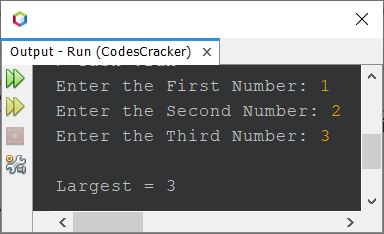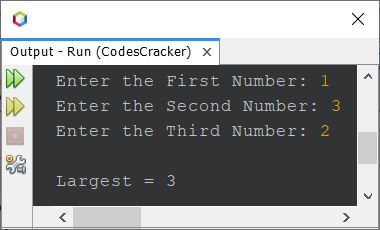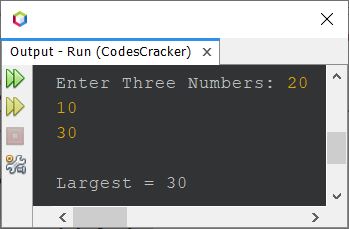- Java Basic Programs
- Java Programming Examples
- Java Print Hello World
- Java Get Input from User
- Java Print Integer
- Java Add two Numbers
- Java Check Even or Odd
- Java Check Prime or Not
- Java Check Alphabet or Not
- Java Check Vowel or Not
- Check Reverse equal Original
- Java Fahrenheit to Celsius
- Java Celsius to Fahrenheit
- Java Perfect Number Program
- Java Find Quotient Remainder
- Java Days to Seconds
- Java Count Digits in Number
- Java Binary Number Addition
- Java Discount Program
- Java Compute Courier Charge
- Java Find Telephone Bill
- Java Print ASCII Values
- Java Check Palindrome or Not
- Java Check Armstrong or Not
- Generate Armstrong Numbers
- Add two Numbers using Pointers
- Java Mathematical Programs
- Add Subtract Multiply & Divide
- Java Make Calculator
- Java Add Digits of Number
- Java Check Leap Year or Not
- Java Check Divisibility
- Java Find Simple Interest
- Java Find Compound Interest
- Java Print Fibonacci Series
- Java Find nCr nPr
- Calculate Average & Percentage
- Java Calculate Arithmetic Mean
- Java Calculate Student Grade
- Java Print Table of Number
- Java Print Prime Numbers
- Java Add n Numbers
- Java Interchange two Numbers
- Java Reverse Numbers
- Java Swap two Numbers
- Count Positive Negative & Zero
- Find Largest of two Numbers
- Find Largest of three Numbers
- Java Find Factorial of Number
- Java Find HCF & LCM
- Area & Perimeter of Square
- Area & Perimeter of Rectangle
- Area & Circumference of Circle
- Java Conversion Programs
- Java Decimal to Binary
- Java Decimal to Octal
- Java Decimal to Hexadecimal
- Java Binary to Decimal
- Java Binary to Octal
- Java Binary to Hexadecimal
- Java Octal to Decimal
- Java Octal to Binary
- Java Octal to Hexadecimal
- Java Hexadecimal to Decimal
- Java Hexadecimal to Binary
- Java Hexadecimal to Octal
- Java Pattern Programs
- Java Pattern of Stars
- Java Pattern of Alphabets
- Java Pattern of Numbers
- Java Pyramid of Stars
- Java Pyramid of Alphabets
- Java Pyramid of Numbers
- Java Print Diamond Pattern
- Java Print Floyd Triangle
- Java Print Pascal Triangle
- Java Array Programs
- One Dimensional Array Program
- Java Linear Search
- Java Binary Search
- Find Largest Element in Array
- Find Smallest Element in Array
- Java Reverse Array
- Insert Element in Array
- Delete Element from Array
- Java Merge two Array
- Java Bubble Sort
- Java Selection Sort
- Java Insertion Sort
- Java Find Common Elements
- Java Count Even/Odd Number
- Two Dimensional Array Program
- Java Add two Matrices
- Java Subtract two Matrices
- Java Transpose Matrix
- Multiply two Matrices
- Three Dimension Array Program
- Java String Programs
- Java Print String
- Find Length of String
- Java Compare two String
- Java Copy String
- Java Concatenate String
- Java Reverse String
- Delete Vowels from String
- Delete Words from Sentence
- Find Occurrence of a Character
- Java Find Occurrence of a Word
- Occurrence of Each Character
- Java Occurrence of Each Word
- Java Count Repeated Characters
- Java Count Repeated Words
- Java Capitalize Each Word
- Java Count Vowels/Consonants
- Java Extract Numbers
- Java Count Word in String
- Remove Spaces from String
- Java Sort a String
- Java Uppercase to Lowercase
- Java Lowercase to Uppercase
- Java Swap two Strings
- Java Check Anagram or Not
- Java Check Balance Parentheses
- Java Check Password Strength
- Java File Programs
- Java Read File
- Java Write to File
- Read & Display File Content
- Java Copy File
- Java Append Text to File
- Java Merge two File
- List files in Directory
- Java Delete File
- Java Miscellaneous Programs
- Generate Random Numbers
- Java Print Time & Date
- Java Get IP Address
- Java Shutdown Computer
- Java Programming Tutorial
- Java Tutorial
Java Program to Find Largest of Three Numbers
This article is created to cover multiple programs in Java that find and prints the largest of three numbers, entered by user at run-time of the program. Here are the list of programs covered by this article:
- Find largest of three numbers using if ... else
- Find largest of three numbers using nested if ... else
- Find largest of three numbers using conditional operator (?:)
Find Largest of Three Numbers using if else
The question is, write a Java program to find the largest of three given numbers. The program given below is its answer:
import java.util.Scanner; public class fresherearth { public static void main(String[] args) { int a, b, c, large; Scanner scan = new Scanner(System.in); System.out.print("Enter the First Number: "); a = scan.nextInt(); System.out.print("Enter the Second Number: "); b = scan.nextInt(); System.out.print("Enter the Third Number: "); c = scan.nextInt(); if(a>b && a>c) large = a; else if(b>a && b>c) large = b; else large = c; System.out.println("\nLargest = " +large); } }
The snapshot given below shows the sample run of above program, with user input 1, 2, and 3 as first, second, and third number to find and print the largest among these three numbers:

Here is another sample run with user input 1, 3, and 2 as three numbers:

Find Largest of Three Numbers using Nested if else
This program is created by implementing the actual logic behind finding the largest number among three given numbers, using nested if...else
import java.util.Scanner; public class fresherearth { public static void main(String[] args) { int a, b, c, large; Scanner scan = new Scanner(System.in); System.out.print("Enter Three Numbers: "); a = scan.nextInt(); b = scan.nextInt(); c = scan.nextInt(); if(a>b) { if(b>c) large = a; else { if(c>a) large = c; else large = a; } } else { if(b>c) large = b; else large = c; } System.out.println("\nLargest = " +large); } }
Here is its sample run with user input 20, 10, and 30 as three numbers:

Find Largest of Three Numbers using Conditional Operator
This is the last program of this article, created using conditional operator or ternary operator, that is ?:. I've used the previous program, to wrap the if...else into conditional operator:
import java.util.Scanner; public class fresherearth { public static void main(String[] args) { Scanner scan = new Scanner(System.in); System.out.print("Enter Three Numbers: "); int a = scan.nextInt(); int b = scan.nextInt(); int c = scan.nextInt(); int large = (a>b) ? ((b>c)?a:(c>a)?c:a) : (b>c)?b:c; System.out.println("\nLargest = " +large); } }
In the following statement, from above program:
int large = (a>b) ? ((b>c)?a:(c>a)?c:a) : (b>c)?b:c;
First the code (condition) a>b gets evaluated. If this code evaluates to be True, then the following code:
((b>c)?a:(c>a)?c:a)
will get evaluated, otherwise the following code:
(b>c)?b:c
will get evaluated. Let's suppose the condition a>b evaluates to be True. Therefore, the following code:
((b>c)?a:(c>a)?c:a)
will get evaluated in a way that the condition b>c gets evaluated. If this condition evaluates to be True, then
a
gets evaluated, otherwise:
(c>a)?c:a)
gets evaluated. This process continues until the whole expression lefts a single variable i.e., a, b, or c. Let's demonstrates the statement using the example given below.
How the Largest of Three Numbers gets Calculated using Conditional Operator
For example, if a=20, b=10, and c=30. Then the statement:
int large = (a>b) ? ((b>c)?a:(c>a)?c:a) : (b>c)?b:c;
gets evaluated as, first the code a>b or 20>10 evaluates to be True, therefore the code ((b>c)?a:(c>a)?c:a) gets evaluated.
That is, the code (b>c) or (10>30) evaluates to be False, therefore the code (c>a)?c:a gets evaluated.
That is, the code c>a or 30>20 evaluates to be True, therefore the code c gets evaluated. That is, no more code to execute, as the final variable is c, therefore the value of c, that is 30 will get initialized to large. That's it.
Same Program in Other Languages
- C Find Largest of three Numbers
- C++ Find Largest of three Numbers
- Python Find Largest of three Numbers
« Previous Program Next Program »